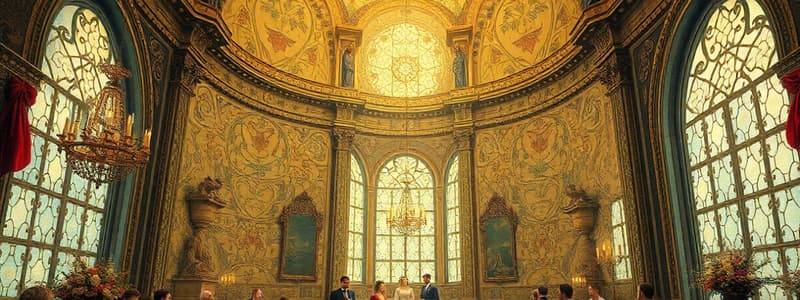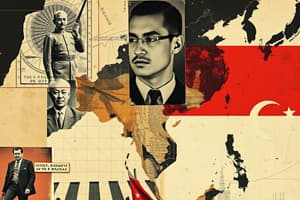Podcast
Questions and Answers
Who financed Robert Fulton's development of the non-exploding steam boat?
Who financed Robert Fulton's development of the non-exploding steam boat?
- George Washington
- Robert Livingston (correct)
- James Madison
- Thomas Jefferson
What was the primary goal of the Embargo Act of 1807?
What was the primary goal of the Embargo Act of 1807?
- To increase shipping in New England
- To end impressment and restrict American trade (correct)
- To support American manufacturing
- To promote trade with Britain
What was a direct consequence of the Embargo Act on New England?
What was a direct consequence of the Embargo Act on New England?
- A rise in shipbuilding activities
- A boost in agricultural exports
- Shift towards manufacturing or westward migration (correct)
- Increased reliance on international trade
What event influenced the signing of the Embargo Act by President Jefferson?
What event influenced the signing of the Embargo Act by President Jefferson?
What legislation replaced the Embargo Act in 1809?
What legislation replaced the Embargo Act in 1809?
What significant agreement was negotiated in April of 1817 concerning the Great Lakes?
What significant agreement was negotiated in April of 1817 concerning the Great Lakes?
What historic voting requirement was abolished first by a New England state?
What historic voting requirement was abolished first by a New England state?
Who led the force that stopped the advance in the context provided?
Who led the force that stopped the advance in the context provided?
What was a notable result of the expansion of the western frontier in the 1820s?
What was a notable result of the expansion of the western frontier in the 1820s?
What was a common fate for leaders of slave revolts according to the information provided?
What was a common fate for leaders of slave revolts according to the information provided?
Which naval hero is associated with The Battle of Lake Erie during the War of 1812?
Which naval hero is associated with The Battle of Lake Erie during the War of 1812?
Which group largely opposed President Madison's declaration for war against Great Britain?
Which group largely opposed President Madison's declaration for war against Great Britain?
What major innovation was introduced regarding suffrage in the 1820s?
What major innovation was introduced regarding suffrage in the 1820s?
What was the status of the Federalist Party by the electoral vote of 1816?
What was the status of the Federalist Party by the electoral vote of 1816?
What significant event happened on September 11 during the War of 1812?
What significant event happened on September 11 during the War of 1812?
How did the right to vote change after the establishment of the United States as an independent nation?
How did the right to vote change after the establishment of the United States as an independent nation?
What was perceived as 'unpatriotic' during the Hartford Convention?
What was perceived as 'unpatriotic' during the Hartford Convention?
What was a major consequence for Native Americans following the War of 1812?
What was a major consequence for Native Americans following the War of 1812?
What was one of the voting requirements during colonial times?
What was one of the voting requirements during colonial times?
What event in 1816 contributed to westward migration from New England to the Midwest?
What event in 1816 contributed to westward migration from New England to the Midwest?
What was one result of the Battle of New Orleans?
What was one result of the Battle of New Orleans?
What characterizes Herrenvolk Democracy?
What characterizes Herrenvolk Democracy?
What was one consequence of Andrew Jackson's extensive use of the veto?
What was one consequence of Andrew Jackson's extensive use of the veto?
How did Andrew Jackson respond to the Nullification Crisis?
How did Andrew Jackson respond to the Nullification Crisis?
What was the purpose of the Indian Removal Act of 1830?
What was the purpose of the Indian Removal Act of 1830?
What event did Nat Turner's rebellion in 1831 lead to regarding slavery discussions?
What event did Nat Turner's rebellion in 1831 lead to regarding slavery discussions?
What was a significant aspect of Jacksonian Democracy?
What was a significant aspect of Jacksonian Democracy?
What did Jackson veto concerning the Second National Bank?
What did Jackson veto concerning the Second National Bank?
What was the underground railroad's purpose, starting in 1838?
What was the underground railroad's purpose, starting in 1838?
What did the Missouri Compromise of 1820 establish regarding future slave states?
What did the Missouri Compromise of 1820 establish regarding future slave states?
What was one significant outcome of the Adams-Onís Treaty of 1819?
What was one significant outcome of the Adams-Onís Treaty of 1819?
Who led the movement of non-Catholic, slave-owning families into Mexican territory?
Who led the movement of non-Catholic, slave-owning families into Mexican territory?
What was a key characteristic of the Era of Good Feelings during James Monroe's presidency?
What was a key characteristic of the Era of Good Feelings during James Monroe's presidency?
What was the main purpose of the empresarios in Mexico?
What was the main purpose of the empresarios in Mexico?
Which event is known as the 'firebell in the night' among historians?
Which event is known as the 'firebell in the night' among historians?
How did the southern states respond to the limitation of property in the Great American Desert as per the Missouri Compromise?
How did the southern states respond to the limitation of property in the Great American Desert as per the Missouri Compromise?
What was the impact of recognizing Mexico's independence in 1822 on the Adams-Onís Treaty?
What was the impact of recognizing Mexico's independence in 1822 on the Adams-Onís Treaty?
What was the purpose of Macon's Bill #2?
What was the purpose of Macon's Bill #2?
Which region was primarily focused on cash crop farming due to its longer growing season?
Which region was primarily focused on cash crop farming due to its longer growing season?
What was the significance of the Louisiana Purchase in 1803?
What was the significance of the Louisiana Purchase in 1803?
How did the Erie Canal affect the Old Northwest region?
How did the Erie Canal affect the Old Northwest region?
What did Fletcher v. Peck signify in terms of contract law?
What did Fletcher v. Peck signify in terms of contract law?
What was the primary motivation behind the War Hawks' desire for war?
What was the primary motivation behind the War Hawks' desire for war?
What type of agriculture was common in the Mid Atlantic region?
What type of agriculture was common in the Mid Atlantic region?
Which statement best describes the Essex Junto's actions?
Which statement best describes the Essex Junto's actions?
Flashcards
Robert Fulton
Robert Fulton
An inventor who successfully applied steam power to propel boats in 1807, building the Clermont, a boat that made regular trips upstream.
Capitalism
Capitalism
An economic system where individuals invest money (capital) in businesses, hoping to make a profit.
Chesapeake Incident
Chesapeake Incident
A major event in 1807 that saw British ships attack an American ship, seizing American sailors, sparking American nationalism.
Embargo Act
Embargo Act
Signup and view all the flashcards
Nonintercourse Act
Nonintercourse Act
Signup and view all the flashcards
War Hawks
War Hawks
Signup and view all the flashcards
HorseShoe Bend
HorseShoe Bend
Signup and view all the flashcards
Treaty of Ghent
Treaty of Ghent
Signup and view all the flashcards
Hartford Convention
Hartford Convention
Signup and view all the flashcards
Battle of New Orleans
Battle of New Orleans
Signup and view all the flashcards
The Year Without Summer
The Year Without Summer
Signup and view all the flashcards
The Second Great Awakening
The Second Great Awakening
Signup and view all the flashcards
The Power of a Contract
The Power of a Contract
Signup and view all the flashcards
Macon's Bill #2
Macon's Bill #2
Signup and view all the flashcards
Essex Junto
Essex Junto
Signup and view all the flashcards
Old Northwest
Old Northwest
Signup and view all the flashcards
Battle of Tippecanoe
Battle of Tippecanoe
Signup and view all the flashcards
Fletcher v. Peck
Fletcher v. Peck
Signup and view all the flashcards
Precedent & Chattel
Precedent & Chattel
Signup and view all the flashcards
Louisiana Purchase
Louisiana Purchase
Signup and view all the flashcards
Property Requirement Abolition
Property Requirement Abolition
Signup and view all the flashcards
Adams-Onís Treaty (1819)
Adams-Onís Treaty (1819)
Signup and view all the flashcards
Missouri Compromise (1820)
Missouri Compromise (1820)
Signup and view all the flashcards
Era of Good Feelings
Era of Good Feelings
Signup and view all the flashcards
Mexican Independence (1822)
Mexican Independence (1822)
Signup and view all the flashcards
Empresarios in Mexico
Empresarios in Mexico
Signup and view all the flashcards
Stephen Austin
Stephen Austin
Signup and view all the flashcards
Land Grants of Northern Mexico
Land Grants of Northern Mexico
Signup and view all the flashcards
Herrenvolk Democracy
Herrenvolk Democracy
Signup and view all the flashcards
Andrew Jackson's Use of the Veto
Andrew Jackson's Use of the Veto
Signup and view all the flashcards
Appeal to the Common Man
Appeal to the Common Man
Signup and view all the flashcards
Nullification Crisis
Nullification Crisis
Signup and view all the flashcards
Nat Turner's Rebellion
Nat Turner's Rebellion
Signup and view all the flashcards
Indian Removal Act (1830)
Indian Removal Act (1830)
Signup and view all the flashcards
Jacksonian Economic Policies
Jacksonian Economic Policies
Signup and view all the flashcards
Bank War (1832-1839)
Bank War (1832-1839)
Signup and view all the flashcards
Demilitarization of the Great Lakes
Demilitarization of the Great Lakes
Signup and view all the flashcards
Caucus
Caucus
Signup and view all the flashcards
Virginia Dynasty
Virginia Dynasty
Signup and view all the flashcards
Property Requirement to Vote
Property Requirement to Vote
Signup and view all the flashcards
Poll Tax
Poll Tax
Signup and view all the flashcards
Universal White Male Suffrage
Universal White Male Suffrage
Signup and view all the flashcards
Year Without Summer (1816)
Year Without Summer (1816)
Signup and view all the flashcards
The Rise of Henry Clay
The Rise of Henry Clay
Signup and view all the flashcards
Study Notes
Era 4 Consequences
- Conscription, or the draft, started in France during the first revolution. It led to the development of "nations."
- Nationalism developed, with the belief that a person's country, rather than just their king or family, is worth fighting and potentially dying for.
- British Dominance, Napoleon was unable to invade Great Britain. Wealthy British banks took advantage of French assets to further develop.
- The first Industrial Revolution was fueled by "seed money" from French expatriates. Banks invested in research and development of textile industries, and steam engines for power (until 1865).
- Imperialism—British steam-powered ships controlled global trade routes (choke points). This dominance persisted until 1914.
- Social Darwinism, British scientists used "eugenics" to justify their global dominance. (until 1945)
Wealthiest Man in The United States
- John Jacob Astor, a German immigrant, was a butcher who started trading furs for Great Lakes furs with Great Britain and France to trade with China (1800's)
Studying That Suits You
Use AI to generate personalized quizzes and flashcards to suit your learning preferences.




